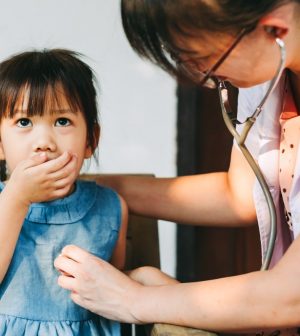- Could Your Grocery Store Meat Be Causing Recurring UTIs?
- Are You Making This Expensive Thermostat Error This Winter?
- Recognizing the Signs of Hypothyroidism
- 10 Strategies to Overcome Insomnia
- Could Artificial Sweeteners Be Aging the Brain Faster?
- Techniques for Soothing Your Nervous System
- Does the Water in Your House Smell Funny? Here’s Why
- Can a Daily Dose of Apple Cider Vinegar Actually Aid Weight Loss?
- 6 Health Beverages That Can Actually Spike Your Blood Sugar
- Treatment Options for Social Anxiety Disorder
Childhood Exposure to Air Pollution May Trigger Bronchitis Years Later

Exposure to air pollution as a child increases an adult’s risk of bronchitis, a new study warns.
Young adults with bronchitis symptoms tended to have been exposed during childhood to two types of air pollutants, researchers found:
-
Particle pollution from dust, pollen, wildfire ash, industrial emissions and vehicle exhaust.
-
Nitrogen dioxide from gasoline engines.
Bronchitis occurs when the large airways of the lungs become inflamed, causing severe coughing spells that bring up mucus or phlegm. Wheezing, chest pain and shortness of breath are other symptoms.
“Our results suggest that childhood air pollution exposure has more subtle effects on our respiratory system that still impact us in adulthood,” said researcher Dr. Erika Garcia, an assistant professor of population and public health sciences at the University of Southern California Keck School of Medicine.
“Reducing air pollution would have benefits not only for current asthma in children but also for their respiratory health as they grow into adulthood,” Garcia added in a university news release.
Air pollution has been consistently associated with lung ailments among children, and childhood lung problems are consistently associated with lung issues as adults, researchers said in background notes.
However, few studies have explored the effect of childhood air pollution exposure on adult lung health, whether or not kids suffered lung problems, researchers said.
Children are particularly vulnerable to the effects of air pollution, researchers said. Their respiratory and immune systems are still developing, and they breathe in more air relative to their body mass than adults.
For the study, researchers analyzed data on more than 1,300 young adults who had participated in a children’s health study.
A quarter of the participants had experienced bronchitis symptoms within the past 12 months, researchers found.
Researchers tracked where the participants lived as they grew, and matched addresses to local air quality measurements taken by the Environmental Protection Agency.
The adult risk of bronchitis was significantly associated with air pollution exposure in childhood, even after researchers adjusted for any asthma or bronchitis the participants had as children, results show.
However, the effect of childhood air pollution on adult bronchitis symptoms was even stronger among those who’d been diagnosed with asthma as kids.
This shows that some children may be more sensitive to the effects of air pollution, Garcia said.
“We may want to be especially careful to protect them from exposure, so we can improve their outcomes later in life,” Garcia said.
Researchers noted that participants with adult bronchitis symptoms were affected by nitrogen dioxide as kids even though average childhood exposure fell far below annual EPA standards — just a bit over half the limit set in 1971 that still stands today.
The findings were published June 28 in the American Journal of Respiratory and Clinical Care Medicine.
“This study highlights the importance of lowering air pollution, and especially exposure during the critical period of childhood,” Garcia said. “Because there’s only so much that we can do as individuals to control our exposure, the need to protect children from the adverse effects of air pollution is better addressed at the policy level.”
More information
UNICEF has more on air pollution and children.
SOURCE: University of Southern California, news release, June 28, 2024
Source: HealthDay
Copyright © 2026 HealthDay. All rights reserved.










